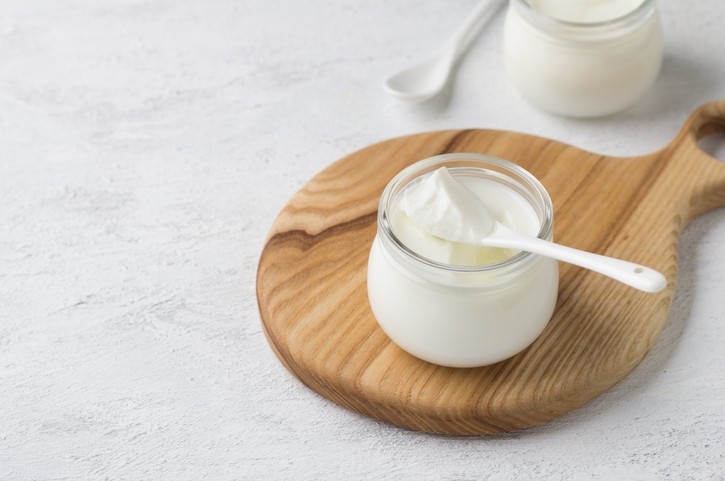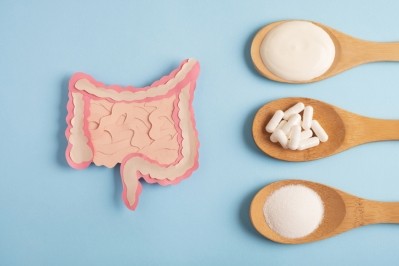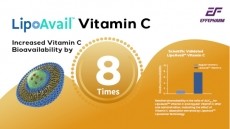New synbiotic yoghurt offers novel solution for metabolic syndrome management – study

Researchers from Tehran University of Medical Sciences in Iran ound that a new synbiotic yoghurt has antioxidant effects that can reduce oxidative stress in adults with metabolic syndrome, potentially reducing the risk of associated disease complications.
“In adults with MetS, daily consumption of the synbiotic yogurt containing native strains of Lactobacillus plantarum, Lactobacillus pentosus, and Chloromyces marcosianos yeast for 12 weeks was associated with improvements in oxidative stress status,” wrote researchers in Scientific Reports.
Studies have shown that an imbalance in the gut microbiome can play an important role in causing oxidative stress, inflammation, insulin resistance, and, as a result, metabolic syndrome.
Modifying the gut microbiota, especially with nutritional approaches, is one of the strategies that has been shown to improve the complications of metabolic syndrome.
Probiotic supplements containing Lactobacillus plantarum have been proven to reduce oxidative stress by boosting antioxidant levels.
Moreover, while there has been extensive research on the potential health benefits of probiotics, research on the use of synbiotic for managing metabolic syndrome has been relatively limited.
The inclusion of Lactobacillus plantarum, Lactobacillus pentosus, and Chloromyces marcosianus in the synbiotic yogurt constitutes a novel blend of microorganisms that has not been widely studied in this area.
Therefore, this study aimed to investigate the impact of this newly developed synbiotic yoghurt on oxidative stress status and some other risk factors for cardiovascular diseases in adults with metabolic syndrome.
The study
For the 12-week randomised, placebo-controlled clinical trial, 44 individuals with metabolic syndrome were recruited from health institutions affiliated to Yasuj University of Medical Sciences. They were between 30 and 50 years old and a body mass index (BMI) of 25–35 kg/m2.
Participants were divided equally into two groups and ate 300g yoghurt daily during the study.
The intervention group ate synbiotic yoghurt containing Lactobacillus plantarum, Lactobacillus pentosus, Chloromyces marcosianos yeast. It also contains 3% of natural plants, which consist of celery, shallot, chicory, and mint.
The control group ate regular yoghurt.
Participants were also asked to adhere to their regular dietary habits and lifestyle, avoiding consuming any additional probiotic or synbiotic products throughout the study.
There were no significant differences in terms of sex, age, physical activity level, BMI, and blood pressure between the two groups at baseline.
Before and after the trial, blood samples from participants were drawn to measure total antioxidant capacity (TAC), total oxidative stress (TOS), and glutathione peroxidase (GPx) – an enzyme that protects cells from oxidative damage.
Improvements in oxidative stress status
There were no reported adverse effects or complications.
By the end of 12 weeks, the control group showed a significant decrease in TAC levels from 0.99 ± 0.14 nmol/ml to 0.92 ± 0.11 nmol/ml.
In contrast, serum levels for the intervention group increased from 0.84 ± 0.11 nmol/ml to 0.99 ± 0.16 nmol/ml.
GPx and TOS levels also showed significant improvement in the intervention group compared to the control group.
The GPx levels for the intervention group increased from 54.42 ± 48.23 U/g Hb to 77.18 ± 38.54 U/g Hb.
In contrast, the GPx levels for the control group dropped from 104.63 ± 56.72 U/g Hb to 80.87 ± 42.81 U/g Hb.
For TOS levels, the intervention group showed a drop from 9.36 ± 3.76 U/g Hb to 7.55 ± 3.55 U/g Hb.
On the other hand, the TOS levels for the control group increased from 9.47 ± 3.02 U/g Hb to 10.11 ± 2.82 U/g Hb.
These findings indicate an enhanced antioxidant defence and a reduction in oxidative stress by consuming the synbiotic yogurt, said researchers.
The results are significant because “elevated systemic levels of oxidative stress biomarkers, as well as decreased antioxidant levels, have been found in patients with metabolic syndrome”, according to researchers.
Research also strongly suggests that this oxidative stress plays a major role in the development of cardiovascular disease in individuals with metabolic syndrome.
The combination of prebiotics and probiotics in synbiotics creates a more favourable environment for beneficial gut bacteria to thrive, resulting in greater improvements in antioxidant capacity and reductions in oxidative stress than probiotics alone.
This makes synbiotics a more comprehensive strategy for managing conditions like Metabolic Syndrome, where oxidative stress plays a critical role.
“In conclusion, the findings of this randomised clinical trial demonstrate that consuming the synbiotic yogurt containing Lactobacillus plantarum, Lactobacillus pentosus, and Chloromyces marcosianos yeast significantly improved oxidative stress status in adults with metabolic syndrome.
“These results support the potential of this new developed synbiotic yogurt as a dietary intervention for individuals with metabolic syndrome, offering a novel approach to ameliorating oxidative stress and potentially reducing the risk of associated complications,” researchers said.
However, further research is needed to explore the long-term effects of synbiotic yogurt consumption and its impact on various metabolic parameters in individuals with metabolic syndrome.
Source: Scientific Reports
DOI: 10.1038/s41598-024-71264-y
“Consumption of a new developed synbiotic yogurt improves oxidative stress status in adults with metabolic syndrome: a randomized controlled clinical trial”
Authors: Mohammad-Amin Zolghadrpour, Mohammad-Reza Jowshan Li et al.


















